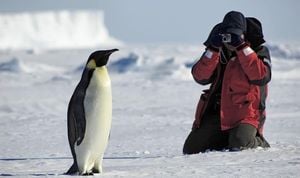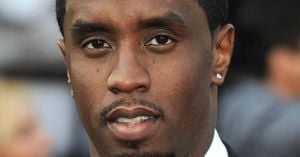Nasa is closely monitoring astronaut Sunita Williams' health as she experiences notable weight loss during her extended mission aboard the International Space Station (ISS). Williams, who initially embarked on what was meant to be only an eight-day mission alongside fellow astronaut Butch Wilmore, has been stranded for over 150 days due to complications with the Boeing Starliner spacecraft. Recent images of Williams reveal a concerning transformation, as she appeared markedly gaunt, raising alarms about the potentially detrimental effects of long-term space travel.
A source associated with NASA expressed deep concern, saying, "She’s become skin and bones." At the mission's onset, Williams weighed approximately 140 pounds. Now, she struggles to meet the daily caloric intake of 3,500 to 4,000 calories, which is necessary to sustain the high energy demands of life in space. This situation has escalated to the point where stabilizing her weight is deemed "a priority" for the agency. Another NASA employee noted, "When you start falling behind on calories, your weight drops fast,” highlighting just how quickly things can change under the demanding conditions of zero gravity.
The challenges faced by astronauts like Williams are multifaceted. Living in microgravity necessitates more intense physical activity than one would typically experience on Earth. Astronauts are required to perform over two hours of daily exercise to counteract muscle and bone loss, which paradoxically increases their caloric expenditure even as they struggle to consume enough sustenance.
Nasa doctors have been closely monitoring Williams’ situation for over a month. Research shows female astronauts may lose muscle at a faster rate than their male counterparts due to specific metabolic adjustments provoked by prolonged space travel. A NASA physician commented, "Williams' appearance reflects the natural stresses of extended high-altitude living, even within a pressurized cabin. It's not uncommon to see some weight loss under these conditions." This helps to contextualize why Williams's weight loss is particularly alarming for medical officials.
The demanding nutritional needs of astronauts are not new. Food prepared for space has to be carefully balanced, often requiring astronauts to eat diets rich in calories and nutrients to avoid weight loss. Standard rations can sometimes feel inadequate due to the gripping challenges of consuming food effectively when floating weightlessly. While ISS provides ample food options, the ability to select and consume the correct types presents real difficulties.
Health professionals are working diligently to accommodate Williams' nutritional deficits, devising plans to help her gain weight. A NASA spokesperson sought to assuage public anxiety about Williams’ health, assuring, "All astronauts aboard the ISS undergo routine medical evaluations, including dedicated monitoring by flight surgeons." This reassurance aims to mitigate fears surrounding Williams' current state as she continues her mission under carefully managed conditions.
Notably, NASA has faced additional challenges during this mission. Williams' prolonged stay arose after the Boeing Starliner—which was intended to ferry her and Wilmore back to Earth—sustained technical failures. Five out of 28 thrusters on the spacecraft failed during the ISS approach, leading to their extended isolation. Although four thrusters were later rectified, questions remain around Starliner’s propulsion capability, especially concerning the re-entry process. Helium leaks observed during testing phases have only compounded worries about the spacecraft's readiness, with some speculating it could delay their return possibly until February 2025.
If Starliner fails to be operable, alternative return options, such as SpaceX's Crew Dragon capsule, are being considered. This backup plan was prompted by concerns highlighted within the space community over the reliability of the Starliner and has triggered discussions surrounding NASA's broader preparedness protocols.
The details surrounding Williams' weight loss and health management have captured public attention, generating conversations and speculation within NASA circles. Some voices are emphasizing the need for improved planning and execution of astronaut health support. A NASA source reflected on this, stating, "We need to take these conditions seriously and remain proactive to protect our astronauts under these demanding circumstances."



